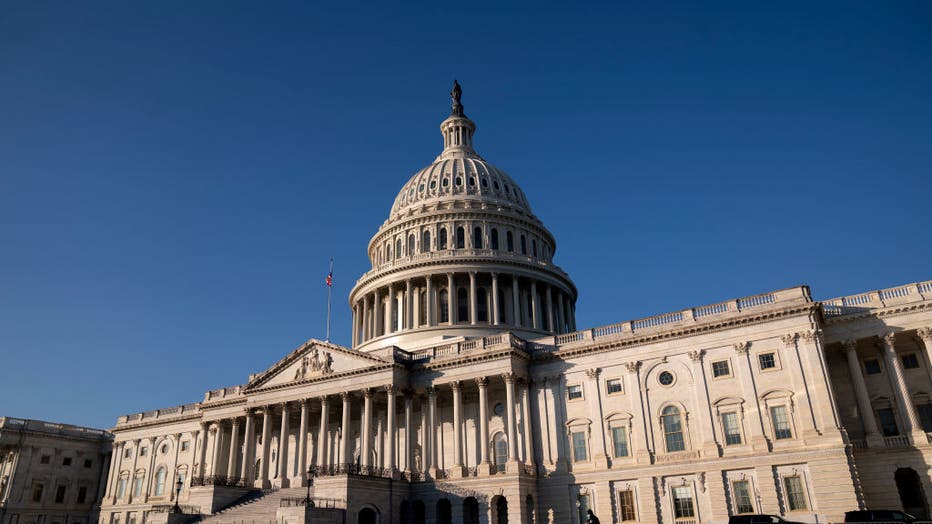COVID-19 relief: New round of stimulus checks remains up in the air as time ticks down
WASHINGTON (AP) - A bipartisan group of lawmakers was unveiling a detailed COVID-19 aid proposal Monday as Congress labored toward a final agreement on a new round of virus relief.
Progress was being reported on other fronts, too, as lawmakers cobbled together a year-end catchall funding package that will be the basis for the last significant legislation of the Trump presidency.
The dozen or so lawmakers sealed agreement on their COVID relief plan over the weekend and decided to offer two bills. One is a $748 billion aid package containing money for struggling businesses, the unemployed, schools, and for vaccine distribution. The other bill proposes a $160 billion aid package for state and local governments and provisions shielding businesses from COVID-related lawsuits, a dynamic favored by Senate Republicans.
RELATED: First US COVID-19 vaccinations given as shipments arrive nationwide
The path forward for their proposals — and for COVID-19 aid more generally — remains unclear. Parallel negotiations over virus relief and government funding are proceeding on the leadership level involving House Speaker Nancy Pelosi, D-Calif., and Treasury Secretary Steven Mnuchin. Senate Majority Leader Mitch McConnell, R-Ky., remains central to any agreement. Outstanding issues include a potential second round of direct payments to individuals, a plan for $300 bonus unemployment benefits, state and local aid, and the GOP-sought liability shield against lawsuits.
There's a hoped-for deadline of midnight Friday to deliver the completed package to President Donald Trump, which is when a partial government shutdown would arrive with the expiration of last week's temporary funding bill. But there's no guarantee that the massive year-end measure will be completed in time. If the talks drag, further temporary bills could be needed.
Meanwhile, negotiations on a $1.4 trillion catchall spending bill are “essentially finished," said a congressional aide participating in the talks. While details are closely held, “the status quo is prevailing." That means Trump would get another $1.4 billion or so for a final installment to continue construction of his long-sought U.S.-Mexico border wall.
RELATED: CDC approves Pfizer/BioNTech's COVID-19 vaccine, allowing U.S. to administer the drug
Republicans have succeeded in killing a $12 billion plan to break last year's budget mini-agreement by using accounting maneuvers to pad veterans health care funding to accommodate big cost increases from expanding access to health care services from private providers. Instead, a different set of moves is being employed to provide for equivalent spending increases for other domestic programs.
At issue are two long-delayed pillars of Capitol Hill's agenda under divided government — COVID-19 relief and the annual appropriations process by which Congress passes day-to-day agency funding bills. Election-year politics and the maddening dysfunction of the Senate have stalled legislation on both topics for months.

The U.S. Capitol stands on December 11, 2020 in Washington, DC.
The post-election lame-duck session is the last chance to wrap up the unfinished work this year, a goal of all involved, though they have been slow until now to forge the often-tricky compromises required to pull the measure together.
Pelosi and Mnuchin spoke Sunday afternoon and are likely to be the crucial pair to watch going down the stretch. She has by no means thrown in the towel on her drive to obtain state and local aid, which was part of the almost $2 trillion CARES Act in March.
President-elect Joe Biden wants as much COVID relief as possible but has no direct influence on the negotiations. While he'll empower Democrats after taking office next year, GOP leaders like McConnell are playing hardball and have forced Pelosi to scale back her demands. And while McConnell supported a $300 per week bonus unemployment benefit this summer, he's pulled back after the November election.
No. 2 House Democrat Steny Hoyer of Maryland displayed flexibility in an appearance on CNN on Sunday that Republicans interpreted as a harbinger of further Democratic retreat.
“The legislative process is a give and take and the items that I just mentioned are absolutely critical to get done, and although I think state and local assistance is critically important, the others are critically important too," Hoyer said.
RELATED: First shipment of Pfizer COVID-19 Vaccine departs from Michigan plant
Also in the mix is a deal to curb “surprise medical bills,” the astonishingly high fees charged to patients with health insurance when they are treated by a doctor or hospital outside of their insurer’s provider network. It’s a particular problem for people getting emergency services and for patients undergoing complex surgeries where another specialist might have to be called in.
Although there’s agreement among most lawmakers and the White House that patients should not face thousands of dollars in unexpected bills, legislation has been slow to gel. It’s been blocked by a lobbying war between consumer groups and insurers on one side, and on the other, doctors and investors in medical practices. The potential compromise would ban surprise bills for emergency room visits and scheduled procedures, but McConnell has yet to endorse the agreement.

